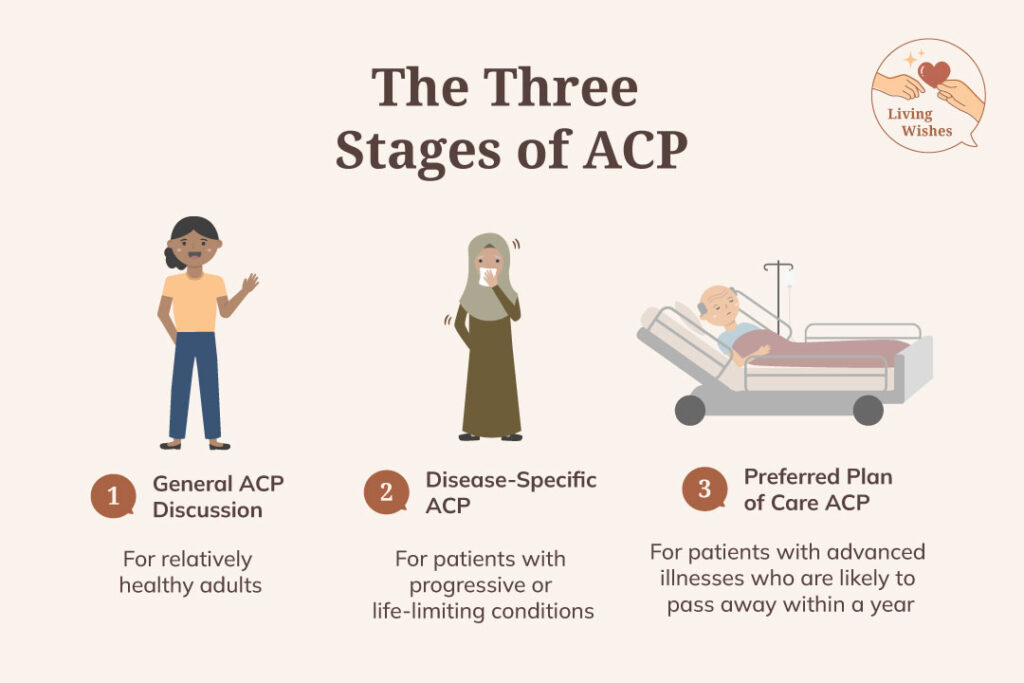Experts Debunk 5 ACP Misconceptions

Do Advance Care Planning (ACP) conversations only revolve around death? Is it only for people who are old or ill? With the various components involved in end-of-life planning, it can be tough to navigate your way and figure out what ACP truly involves.
In a Living Wishes’ survey among 105 Singapore residents aged 35 to 59, it was found that:
- 61% of respondents thought that ACP is a legally-binding document.
- 31% thought that ACP requires them to engage a lawyer.
But is this really true? To separate between truths and falsehoods, we spoke to three experts to debunk common misconceptions about ACP.
Misconception #1: ACP is a legally-binding document
Unlike many other documents in Singapore, an ACP is not legally binding and does not require a lawyer. Rather, it’s a discussion held with your loved ones and healthcare providers about your care preferences. In the event when you’re unable to make your own healthcare decisions, it then aids your physician in making decisions in your best interest.
“It doesn’t mean that the ACP has no legal weight. If your preferences are clearly and consistently expressed, and consistent over time, it can stand in the court of law,” explained Dr Raymond Ng, Head of Palliative and Supportive Care at Woodlands Health Campus.
Misconception #2: ACP cannot be changed once it is documented
Since ACP is an ongoing process, you may change or review your care preferences at any point in time. It’s important to update your ACP when your preferences, Nominated Healthcare Spokesperson (NHS) or medical condition changes.
Making changes to your ACP is easy – simply get in touch with an ACP facilitator and share your revised preferences with them! These will then be updated in the National Electronic Health Record.
Misconception #3: ACP can only be initiated by a professional facilitator
Anyone can begin an ACP conversation with their loved ones. This conversation can take place anywhere – from the dining table to hospitals or polyclinics. Cynthia Chng, Manager of the Training Portfolio in the Advance Care Planning Team at the Agency for Integrated Care (AIC) shared that ACP is a conversation like any other conversation that you have.
“You can broach the topic by downloading some of these Advance Care Planning workbooks from the Internet, and discussing with your loved ones before you then complete the process by undergoing a full process of facilitation with a certified ACP facilitator,” added Dr Raymond Ng.
ACP can be facilitated and documented at various touch points where a professional facilitator will take you through the process.
Misconception #4: ACP is only necessary for people who are old or ill
“Most patients have it done towards the end-of-life but actually, ACP should be done much earlier, when we’re able to carry out the conversation, when our memory is still intact, when we’re still able to talk,” explained Dr Adeline Lam, Advance Care Planning Co-Clinical Lead & Senior Consultant of General Medicine at Tan Tock Seng Hospital.
Discussing and documenting your healthcare preferences in advance gives you and your loved ones peace of mind. While ACP is for anyone and everyone, it is more pressing for those with life-threatening illnesses or conditions.

You can find out more about the three types of ACP below:
- General ACP: For relatively healthy individuals. This will involve indicating your care preferences to prioritise comfort or life-sustaining medical treatments during a sudden event.
- Disease-Specific ACP: For patients with progressive or life-limiting conditions. This will involve decisions on specific disease-related care and treatment preferences in the event of serious complications.
- Preferred-Plan-of-Care ACP: For patients with advanced illness. An ACP conversation involves discussing their preferences for cardiopulmonary resuscitation (CPR), place of care and death, etc.
Misconception #5: ACP is expensive
Generally, the cost of ACP ranges from $0 to $50 in Singapore depending on the healthcare provider. ACP can be done at government hospitals, polyclinics and social care providers.
“It is a conversation, so the expensive part is really your time,” Dr Adeline Lam said. Given the benefits that ACP brings, it is worth the time to discuss it with your loved ones. Unnecessary medical costs and potential conflicts over decision-making can be lessened in the future .
You may refer to AIC’s ACP Directory for a consolidated list of places to make an ACP appointment. Learn more about Advance Care Planning, or watch our latest video where experts debunk 5 ACP misconceptions!